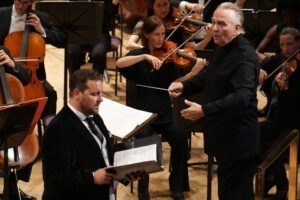Oh, what a night. In front of a packed Bridgewater Hall in Manchester, the Hallé Orchestra and Choir delivered a truly divine performance of Sir Edward Elgar’s The Dream of Gerontius.
The concert was the first of Elgar’s three great oratorios, with the other two, The Apostles and The Kingdom, being performed by The Hallé in just seven days. Elgar, that most English of composers, based his Gerontius on the eponymous poem by that most English of Catholics, Cardinal John Henry Newman. Now Saint John Henry Newman following his canonisation in 2019, Newman was the quintessential Victorian polymath – an academic, philosopher, theologian, historian and musician.
Newman’s great mystical poem is the prayer of a dying man, along with various demonic and angelic responses, as he passes from this world to the next. Apart from its innate lyrical beauty, various elements have captured the imagination of many a soul since it was first published in 1865, not least its themes of mortality, life after death, redemption, not to mention the thorny old conundrum that is purgatory.

Photo by Alex Burns.
A fellow Catholic, Elgar knew the poem well, having owned a copy since at least 1885. So, when he began work on his Gerontius in the autumn of 1899, the composition came quickly to him. That said, Elgar clearly gave his all in its creation. In a letter to a friend, he wrote: “I’ve seen in thought the Soul go up, and have written my heart’s blood into the score.”
Sadly, its first performance in Birmingham in 1900 was a decidedly lacklustre affair, with poor performances all round, leaving Elgar crestfallen. He soon cheered up, however, as performances in Germany and London demonstrated the beauty and genius of his work. Today, Gerontius is now rightly regarded as Elgar’s finest choral composition.
And so to the Hallé.
Expectations were high as Gerontius is no stranger to Sir Mark Elder and the Hallé, and from the start those expectations were exceeded. The orchestra set the scene, beckoning the audience with soulful strings and solemn brass to bear witness to the last of the man Gerontius as he gently slips from this world. And though his passing may be gentle, it’s still death that approaches and he is frightened.
His fear, along with the enormity of the occasion, were expertly woven, first by the orchestra and then by Michael Spyres as the man Gerontius. Spyres delivered a celestial performance which evoked pathos from all present, with everyone silently rooting for Gerontius on his journey between worlds.

Michael Spyres and Sir Mark Elder: Photo by Alex Burns.
Next, we encounter him as he is gently awakening, but not as the man Gerontius, but now as the Soul Gerontius, and awaiting him is his guardian angel, wonderfully performed with admirable power and precision by Alice Coote. But she is not alone.
It’s often said that the devil has the best tunes, and to hear the massed Hallé Choir sing the demon’s chorus one could almost believe it. In singing the full might of hell, they sent chills down the spine of the audience, and how we loved them for it. It was hard to imagine what might prove more musically powerful than this, yet the same magnificent Hallé choir raced to the rescue of the Soul Gerontius, as the Choir of the Angelicals, battling in song with the demons to rescue the Soul for The Choir Invisible.
What a glorious and powerful performance this was from Hallé Choir, demonstrating an astonishing range and a magnificent commitment to the performance throughout, and all delivered with such delightful élan.
As I gazed across their massed ranks my eyes alighted upon one particular chorist, who uniquely (and incredibly) appeared to be singing completely off book. I watched with distant delight as she sang her best life, enunciating every demonic “ha-ha” with devilish glee, and every “Praise to Him” with angelic devotion. Praise to thee dear chorist, praise to thee indeed.
Soloist Neal Davies added greatly to the performance in his role as the Angel of Agony. As we moved inexorably towards the final judgement, every element – choir, conductor, orchestra and soloists – came together in perfect harmony to create the immensity of the moment when the Soul finally faces The Almighty.
And, when the final Amen had floated to the heavens, the massed ranks turned to face the audience and a richly deserved standing ovation.

Neal Davies, Michael Spyres, Alice Coote. Photo by Alex Burns.
Photos: copyright Alex Burns
bridgewater-hall.co.uk/whats-on/








